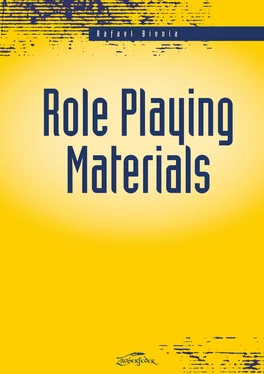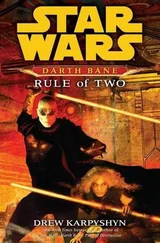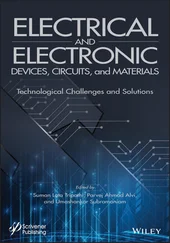It is not enough to re-think role playing as a phenomenon that includes narrative, ludic, and material actors. Tracing relational work between these actors, actor-network theory aims to change how a researcher learns to know and justify this knowledge about collaborating actors. Instead of referring phenomena back to concepts, I use words that have emerged from inside field work. The vocabulary at the end of this chapter is the result of my field work. It has changed in the past years when I refined it to keep my preconceived notions at bay. When I observed and analyzed what happened during game sessions, my understanding changed from role-playing games that some define as games with, for example, the mindset of role playing, to role-playing games as processes, as actor-networks that gather diverse actors and make them work together at specific sites. Using network as a mode of inquiry provides the researcher with a methodological toolbox that at the same time changes the theoretical framework. Thus, a theoretical framework is less a context than a toolbox. With the tool mode of inquiry I localized role playing in the process between actors. In this regard, the theory adds itself as an actor to the researcher’s work, and as an actor, it changes its own work of constructing ontological meaning. Having explained the two meanings of network, I now return to the process, the “making a difference,” because it also explains the how actors gather, or organize, other actors to form networks that last over time.
2.2.3 Agency, or making a difference.Actors “can be made to act through the agency of a magic wand, a dwarf, a thought in the fairy’s mind, or a knight killing two dozen dragons” (Latour, 2005, p. 54). Latour does not refer here to fantasy role-playing games, but to actors that they share with fairy tales. He points out that actors act on behalf of sometimes surprising actors. Agency is the word used when referring to heterogeneous actors that act according to the same goal, such as role playing. The difference between actor and agency is that the actor does something and agency explains “the different ways to make actors do things” (Latour, 2005, p. 55).
“Making a difference” is conceptualized as agency, which is a much contested concept in social theory, but in game studies is defined as a human capacity (Wardrip-Fruin et al., 2009). While this different definition shares the understanding of agency as ability, it differs in explaining how this ability comes into action, whether it is possible to think of agency as ability, and whether the ability is an inward power, or rather a relational effect. Actor-network theory diverges from these definitions by viewing agency not as a concept that the researcher has to trace, but again as a word for a difference making process that only exists when the researcher observes an empirical trace. Agency is a source for inquiry or uncertainty about what is part of what happens. Thus, agency aims at an observable capacity to act and matter and make a difference in the world, a capacity that comes into action when actors relate with each other. Instead of an inward power in game studies’ sense of agency, agency in actor-network theory refers to streamlining actions to one action. When I refer to role playing as agency, role playing is the “streamlining” action that emerges from and constitutes the inter-relational actions of heterogeneous actors. These actors’ actions form connections and when enough connections flow together, they create the role-playing game network and role playing works.
When “[a]ctors fill the world with agencies” (Latour, 2005, p. 52), how can a researcher understand the process of creating agency in the world? As there is no causal agency, “there might exist many metaphysical shades between full causality and sheer inexistence: things might authorize, allow, afford, encourage, permit, suggest, influence, block, render possible, forbid, and so on” (Latour, 2004, p. 226). Agency that refers to the level of a network makes a difference to the relations between all heterogeneous actors. In this study, the agency on the level of a role-playing game network, is role playing. In order to make a difference according to the agency of role playing, all actors have to change their actions. I examine this process when I ask how materials, as one group of actors, make role playing as agency work in a role-playing game network.
When all actors have to change their actions, every actor follows its own agency before the network comes into being. Therefore the agency on the level of the network emerges when all actors abandon the agencies or “that they have lined up behind them,” because every actor is a network of other actors (Sayes, 2014, p. 138). In the example above, a pencil is an actor that consists of a graphite core and wooden body.
Agency explains the multi-sited understanding of action as an effect across multiple actors. Following actors negotiating across different role-playing game sites and forms, actors can inscribe the agency of role playing to different degrees, depending on the outcome of the negotiations between actors. “They [actors] will not only enter into a controversy over which agency is taking over but also on the ways in which it is making its influence felt” (Latour, 2005, p. 57). A “felt” influence is an influence that the analyst can trace. Again, instead of influence, I refer to this process as “making a difference.”
2.2.4 Mediator and intermediary, or translating agency.The word mediator refers to an actor that changes what other actors do in the network. As actor-network theory speaks of processes, this happens during the mediator’s implementation to the network. At one moment, the mediator inscribes its agency to any degree into other actors’ processes. “ Mediators transform, translate, distort, and modify the meaning or the elements they are supposed to carry” (emphasis in original, Latour, 2005, p. 39). A mediator that transforms a game network, for example chess, is the clock. Playing against time turns the game of chess into fast chess and the clock becomes an actor that modifies how the game session works.
The word intermediary refers to an actor that spreads agency without changing it. “An intermediary , in my vocabulary, is what transports meaning or force without transformation: defining its inputs is enough to define its outputs” (emphasis in original, Latour, 2005, p. 39). An intermediary of fast chess, for example, could be a wooden chess board. The wood prevents the board from changes, thus the board repeats its action of presenting a field of 64 squares. Thus, the board spreads the agency of chess playing without changing it across the network of players, pieces, and so on.
The researcher remains uncertain whether to refer to an actor as an intermediary or mediator, because this uncertainty is the starting point of an actor-network study (Latour, 2005, p. 39). Latour suggests to “ask the actor” if the actor matters as a mediator or not. An additional question could be to think of an ex negativo case: imagine that there is no board in a game of chess or no costume in a live action role-playing game session.
So far, I have elaborated upon actor-network theory as an infra-language that helps the researcher to question and talk about the phenomena seen during field work. The next section returns to the methodological principle of “follow the actors” to explain how I selected qualitative data about material actors, role playing agency, and role-playing game networks.
2.3 Methodology, or Selection of Qualitative Empirical Data
2.3.1 From participant observation to field notes.Originating in Malinowski’s first reflections (1922), participant observation developed to a method in ethnography. Participant observation is “a way to collect data in naturalistic settings by ethnographers who observe and/or take part in the common and uncommon activities of the people being studied” (DeWalt & DeWalt, 2002, p. 2). Through the extended face-to-face encounter with the actors of interest, and participating in extraordinary and mundane actions, observations gain their empirical quality, because there “is no substitute for gaining tacit and implicit knowledge of cultural behavior than living among people and sharing their lives” (DeWalt & DeWalt, 2002, p. 291). I got insights in the wider activities of role players by participating in game sessions, and in discussions before and after them. The advantage of “being native” myself in this culture was that I had already established rapport as a role player and photographer in different communities of larp and tabletop role-playing games. The disadvantage was my familiarity with these games as player and designer. I needed to alienate myself to gain the third perspective of a researcher. I achieved this by consciously changing perspectives.
Читать дальше












